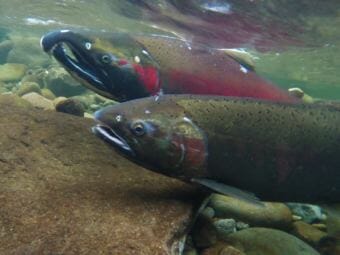
A new study has found that one of the coho salmon’s most valuable senses may diminish as more carbon dioxide enters the North Pacific Ocean — threatening their ability to avoid predators, find their way back to their natal streams and even find spawning mates.
Chase Williams is a post-doctoral researcher at the University of Washington. Williams worked on the study in conjunction with the National Oceanic and Atmospheric Administration’s Northwest Fisheries Science Center.
“We did this study because over the last almost 10 years, there’s been a lot of research coming out of Australia on tropical reef fish and couple of other places in the world looking at the elevated effects of CO2 levels and fish behaviors,” Williams explained.
In this particular study, Williams and his colleagues measured juvenile coho salmon’s ability to detect predators by injecting ground-up salmon scales into tanks holding individual fish.
“So normally a fish’s skin is lacerated, say by a predator munching down on a fish. There’s a chemical cue or cues — no one is quite exactly sure what yet,” Williams said. “But those odors are released into the water, and nearby species have a very strong avoidance reaction to it.”
For two weeks prior to the test, different groups of juvenile coho were exposed to current carbon dioxide levels in Puget Sound and estimated levels both 50 and 100 years from now.
The study measured each fish’s avoidance response when scales were injected into their tanks, and coho that were exposed to higher levels of carbon dioxide were increasingly indifferent to the smell.
“We found that the salmon are likely still smelling the odors. So there are no changes in the way their nose is detecting the odors,” Williams noted. “But we did pick up changes in the way that their brain was potentially processing those odor signals. So that’s what is likely driving the behavioral changes.”
Williams hopes to conduct similar experiments on other salmon species, but he said this study is a concern for all salmon from the Pacific Northwest to Alaska — particularly for populations that are currently struggling.
